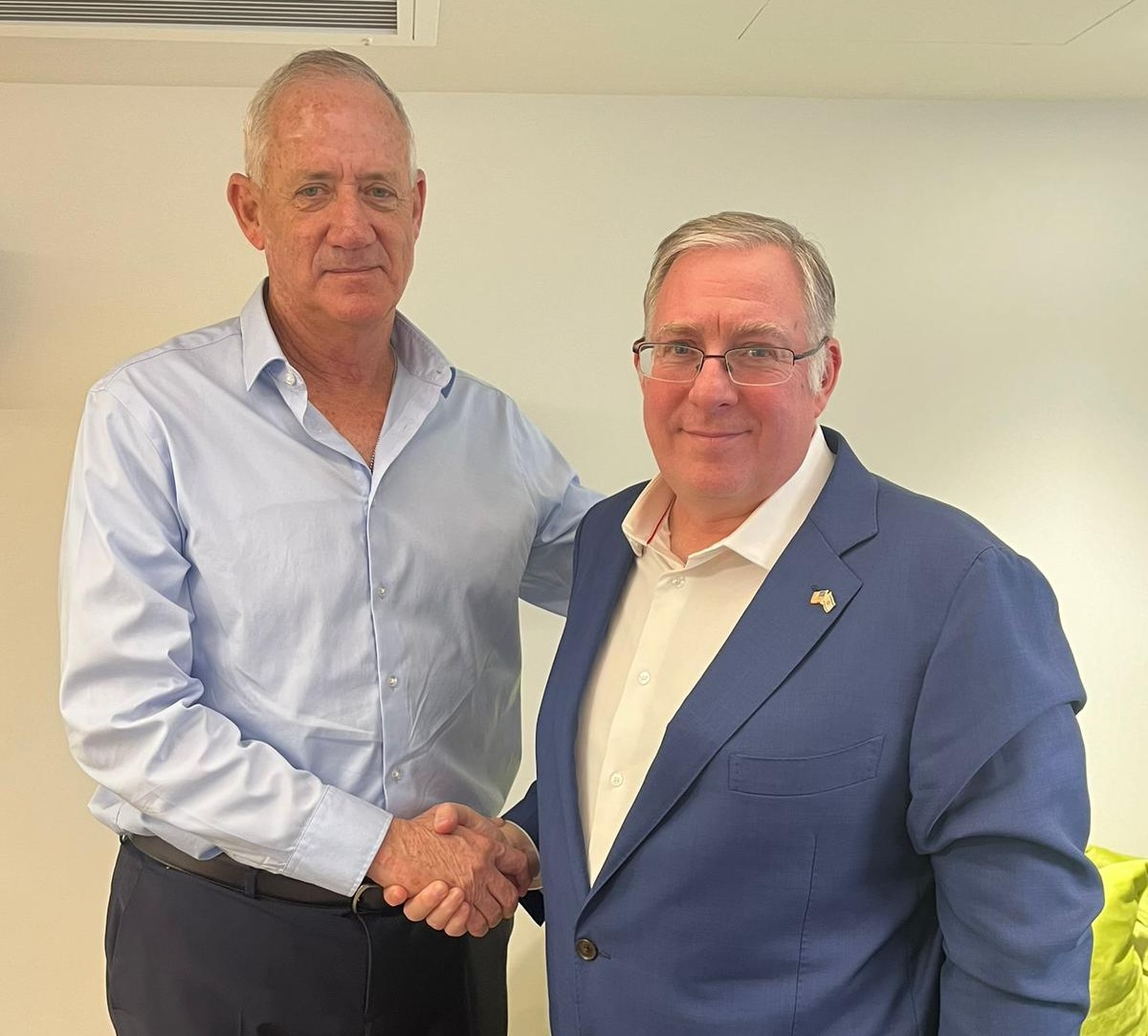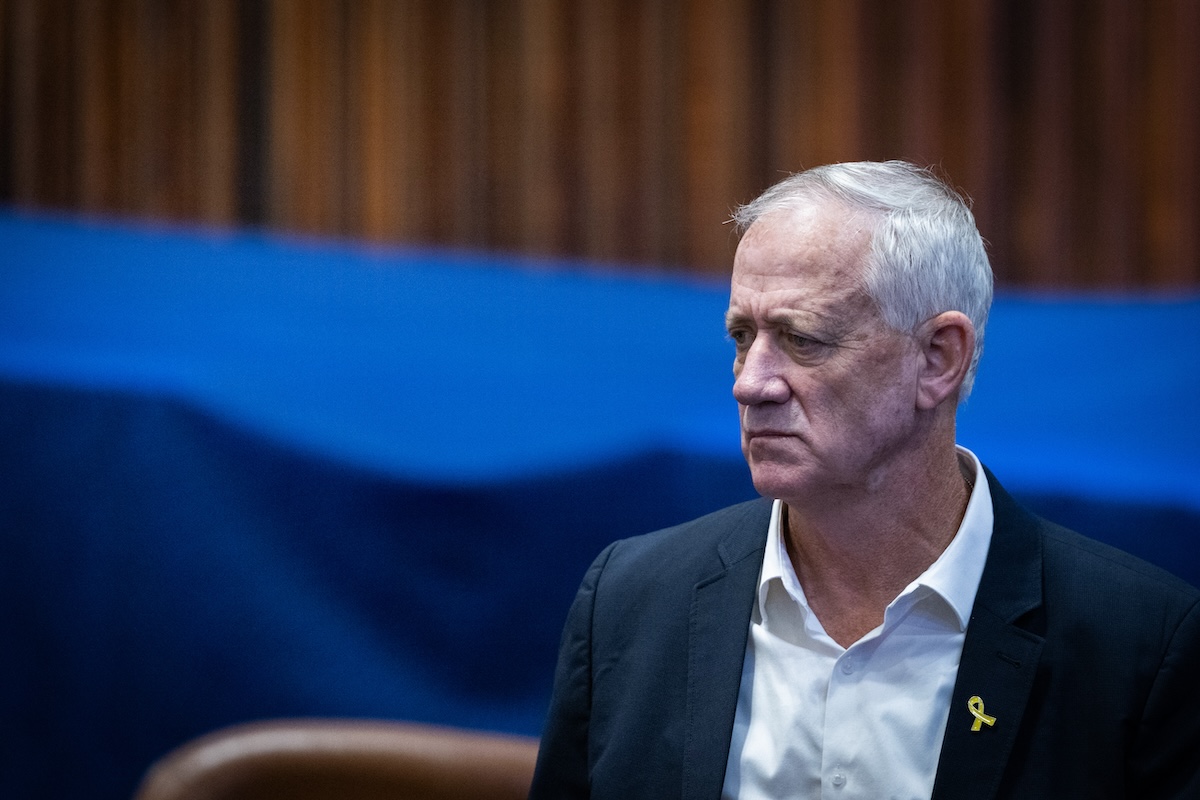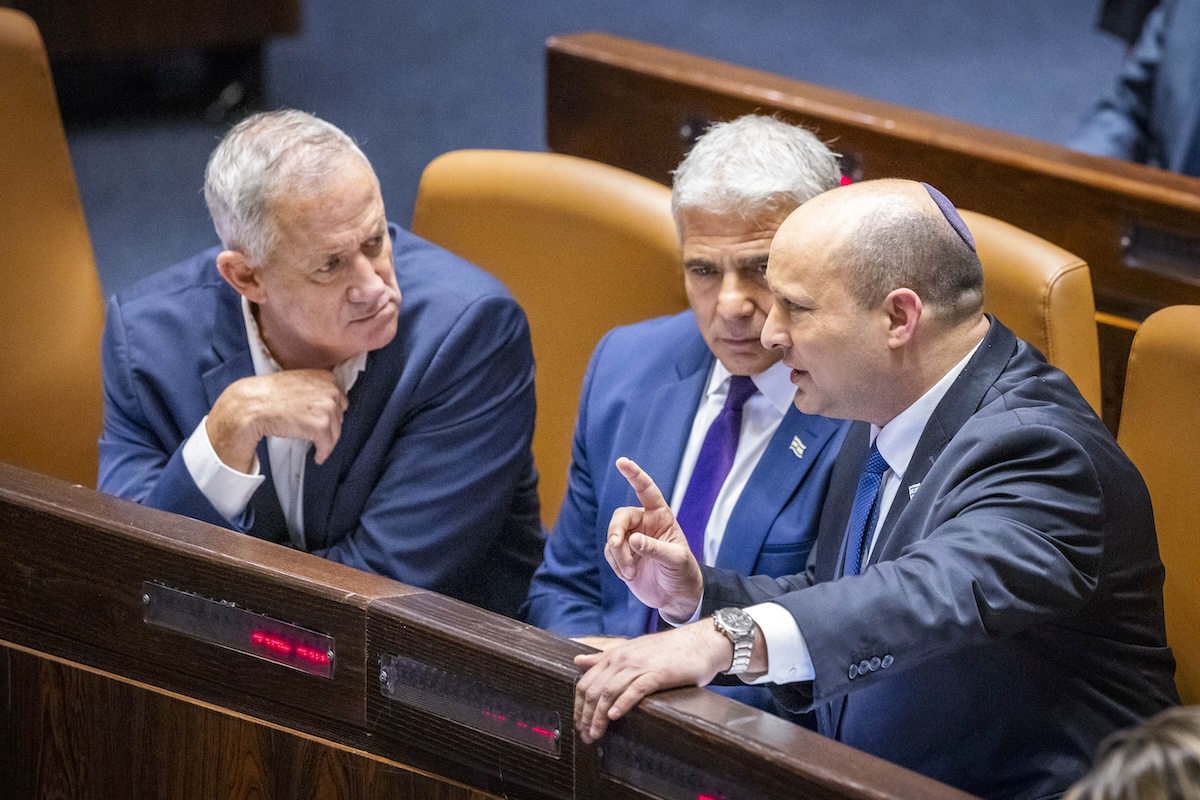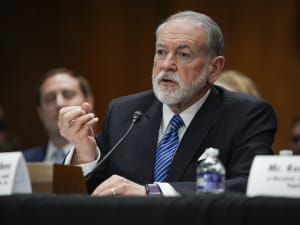Four reasons Benny Gantz believes Trump’s return is going to be great for Israel and for peace
Former defense minister sits down with ALL ISRAEL NEWS as he contemplates Trump’s return and Netanyahu’s departure

JERUSALEM, ISRAEL — Benny Gantz may be 65, but he has no plans to retire.
To the contrary, Israel’s highly respected former defense minister – and former alternate prime minister –believes a new and very positive era in U.S.-Israel relations is coming with Donald J. Trump returning to office.
He also believes a post-Netanyahu era is coming.
Soon.
And Gantz appears to be quietly, yet carefully, preparing to play a major role in what comes next.
These were some of the impressions I got after spending an hour with Gantz and two of his senior advisors last week.
Gantz had originally invited my wife, Lynn, and me (and one of our senior aides) to meet with him at his home in Rosh Ha’ayin, or at his second home, located in southern Israel, not far from the Gaza border.
However, a last-minute change of plans required us to meet at a conference facility in Ramat Gan, a suburb of Tel Aviv.
The ground rules were that I could not quote Gantz directly – he wanted to be able to speak freely about a wide range of issues, including sensitive ones – but I could report my observations and impressions of our meeting.
As we sipped cappuccinos and espressos with his staff, Gantz entered the room looking rested and relaxed, wearing dark slacks and a light blue, open-collared, blue dress shirt with no tie and no jacket.
Around his neck dangled the same metal dog tag saying, “Bring Them Back Home,” that many Israelis have been wearing since October 7 to remember our hostages still held by the terrorist regime Hamas in the Gaza Strip.

BUILDING TIES TO EVANGELICALS
It was good to see him again.
Gantz and I first met about four and a half years ago when he asked me to brief him about why the 60 million-strong Evangelical Christian community in the U.S. — and some 600 million Evangelicals worldwide — love Israel so much and how he could begin building relationships with various Evangelical leaders.
I was happy to oblige.
After all, I believe that it’s important for Israeli leaders of every ideological persuasion to better understand the deep and unconditional love that followers of Jesus have for Israel and the Jewish people.
That’s why I’ve done similar briefings in Jerusalem, Tel Aviv, and throughout Israel.
Over the years, Gantz and I have continued to meet and talk.
After the historic Abraham Accords were signed, sealed, and delivered, I brought a delegation of Evangelical leaders to the United Arab Emirates, the Kingdom of Bahrain, and Israel to meet with and pray for senior officials in each country.

Gantz – who was defense minister at the time – graciously hosted us in his private conference room in the Kirya, Israel’s equivalent to the U.S. Pentagon, and briefed us on his views of the rapidly improving climate between Israel and the Sunni Arab world.
Later, Gantz gave me an exclusive interview about his assessment of the Iranian nuclear and terror threat for my non-fiction book, ENEMIES AND ALLIES.
This time, we again talked about Gantz’s interest in and appreciation for the Evangelical community and his desire to continue building relationships with Christian leaders.
GANTZ BELIEVES THE WARS WITH HAMAS AND HEZBOLLAH ARE ALMOST OVER
The bulk of our time together, however, focused on his assessment of Israel’s wars against Hamas in Gaza and Hezbollah in Lebanon – which have now hit 400 days – and where he believes Israel is heading next.
It soon became clear that Gantz believes Israel is winning on both fronts – and will be able to wrap up major combat operations in early 2025.
It also became clear that he believes a day of reckoning is coming for current Prime Minister Benjamin Netanyahu and all those in the upper echelons of the Israeli security and intelligence establishment.
The failures of the Israeli government were so profound and inexcusable on October 7 that Gantz believes Netanyahu and many other prominent figures will retire or be fired by the public.
Gantz didn’t want to talk about whether he would like to serve as the country’s next prime minister or would be content serving as defense minister again, or in some other senior position.
Politics and political prognostications seem to hold little interest for him.
He’s much more interested in thinking about how to shape a new and better future for the Israeli people.
And how to restore the trust between the society and the government – and the military – that was strained before October 7 and shattered afterward.

FOUR REASONS GANTZ SEES TRUMP’S RETURN TO POWER AS GREAT FOR ISRAEL
One big sign of hope for the Jewish state, Gantz believes, is the landslide election of Donald Trump to become the next American president and the next commander in chief.
Trump secured 51% of the popular vote and 312 votes in the Electoral College, needing only 270 to win.
Republicans also won control of the Senate and look poised to retain control of the House.
In light of this, I came away with four observations based on our conversations in Ramat Gan and in the days that followed.
First, Gantz believes President Trump’s love and support for Israel – and Trump’s successes in his first term in the region – make him the ideal leader to reestablish calm in the Middle East and expand the Abraham Accords.
Gantz clearly and deeply personally appreciates Trump’s pro-Israel convictions and Mideast strategy.
It was also clear that he is very grateful for the importance Trump places on advancing plans that have deep and wide consensus in Israel and not jamming new, untried, untested ideas down Israel’s throat.
My impression is that while Gantz strongly believes in the importance of maintaining bipartisan support for Israel in Washington – and that he was more than ready to work closely with the Harris-Walz team if they won – he enjoyed and valued the intimate partnership he had with President Trump and team and looks forward to working with them again to accomplish even more.
Second, Gantz believes that President Trump’s Middle East peace plan is the most realistic of any that have been discussed in recent years.
Why?
Because while it envisions a small and demilitarized Palestinian state sometime in the future, it does not force Israel back to the 1967 lines.
It acknowledges Israel’s real and pressing security needs.
It acknowledges that Palestinians need to live in peace and security without allowing them to pose a danger to Israel.
And Gantz feels it would be an excellent starting point for other Arab partner states, who need to see a realistic chance for ending the Palestinian-Israeli conflict on the political horizon.

Third, Gantz believes that Trump is best suited to quiet and contain the Iranian regime.
He knows Trump does not want a full-blown war with Iran to erupt.
Nor does he, unless it is absolutely necessary.
But Gantz believes that if Trump re-imposes his “maximum pressure” campaign of extreme economic and diplomatic sanctions on Tehran, and combines this with a robust American military threat to the regime, the U.S. may be able to force the Iranians to stop attacking Israel, stop pursuing nuclear weapons, and stop exporting terror throughout the region and the world without having to resort to a kinetic war.
Fourth, Gantz believes that Trump will finalize an historic and transformational peace and normalization agreement between Israel and Saudi Arabia that President Joe Biden and Vice President Kamala Harris were unable to achieve.
I got the distinct impression that Gantz is personally aware of — and intrigued with — the deep regard that Arab leaders have for President Trump.
He’s also impressed by the respect that Trump has for moderate, peaceful leaders throughout the Sunni Arab world.
It’s this combination that allowed Trump to broker four Arab-Israeli peace agreements in his first term.
Gantz is certain Trump can and will expand that number in his second term.

WHAT DOES THE FUTURE HOLD FOR BENNY GANTZ?
To be clear, ALL ISRAEL NEWS is a non-profit and non-partisan media organization.
We don’t endorse political candidates in Israel or any other country.
We interview leaders of all backgrounds and try to cover and analyze them fairly and accurately.
I have no idea whether Gantz will one day replace Netanyahu as prime minister, nor do my colleagues or I take a position on whether that would be a good or bad development.
That said, I do believe Evangelicals should keep a close eye on Gantz because he is a fascinating and compelling political figure.
After serving 38 years in the Israeli Defense Forces, including as the IDF’s chief of staff, Gantz entered politics in December 2018.
Creating the “Israeli Resilience Party,” he quickly became one of the most popular leaders in the country, positioning himself on the center-right of the ideological spectrum.
When he forged an alliance with several other parties – notably Yair Lapid of the center-left “Yesh Atid” party, and Naftali Bennett of the right-wing “Yamina” party – the trio emerged as a political juggernaut.
They drove Netanyahu out of office, made Bennett the new prime minister, installed Lapid as the foreign minister, and Gantz became the defense minister.

When Netanyahu found a way to regain power, Gantz and his colleagues went into the opposition.
After October 7, however, Gantz was the only one of the three to agree to accept Netanyahu’s offer to create a national emergency unity government.
He also agreed to serve in the War Cabinet, a three-person council composed of Netanyahu, then-Defense Minister Yoav Gallant, and Gantz.
Why did Gantz agree to do this when his relations with Netanyahu have been strained – even combative –over the years?
Because Gantz’s defining brand here in Israel is that he puts the security and prosperity and unity of the nation above all political considerations.
That’s why he rebranded his party the “National Unity Party.”
He was sharply criticized by Lapid and Bennett and many of their supporters for joining the Netanyahu government at the time.
Yet among many others – including those who disagreed with him – Gantz was applauded and respected for putting the needs of the nation first.
In June, however, Gantz and his team decided they had accomplished all that they could.
Frictions with Netanyahu were intensifying again and Gantz resigned.
Back in the opposition again, he is biding his time, and laying the groundwork for the post-Netanyahu era he is certain is just around the corner.

Joel C. Rosenberg is the editor-in-chief of ALL ISRAEL NEWS and ALL ARAB NEWS and the President and CEO of Near East Media. A New York Times best-selling author, Middle East analyst, and Evangelical leader, he lives in Jerusalem with his wife and sons.













